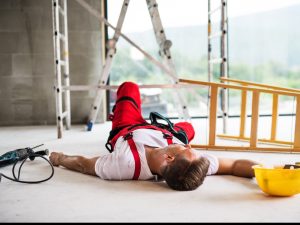If you suffered a life-changing injury while in the workplace, you may wonder if you are eligible to make a serious work injury claim. In this article, we discuss very severe injuries you could sustain in an accident at work.
We explain the specific requirements you must meet in order to have a valid claim. These are further illustrated with a look at how a work accident could result in a serious injury.
You might be interested in learning more about how compensation could be awarded in successful work accident claims. This article takes a look at how settlements are awarded for serious injury claims.
If you are thinking about making a compensation claim for a serious injury, you might be interested in having legal representation. This article looks at the benefits of having the support of a solicitor on a No Win No Fee basis during the personal injury claims process.
Our advisors are here to help you with any questions you may have about serious injury compensation claims. They can also help you get a workplace injury claim started today.
To speak to a team member about workplace accident claims:
- Call 020 8050 2736
- Fill in details about your serious injuries using our claim online form and an advisor will call you.
- Connect using our live chat.
Select A Section
- When Are You Eligible To Make A Serious Work Injury Claim?
- How Could A Serious Injury Happen At Work?
- How Much Compensation For A Serious Injury Claim At Work?
- Evidence That Could Help In A Serious Work Injury Claim
- Make Serious Injury Claims On A No Win No Fee Basis
- More Resources About Claiming Work Injury Compensation
When Are You Eligible To Make A Serious Work Injury Claim?
A serious injury has life-altering consequences that impact your quality of life. They may include symptoms such as paralysis or effects on your cognitive functioning. If you suffer an injury at work, you might be eligible to make a personal injury claim.
While you are in the workplace, your employer is legally required to take all reasonably practicable steps to ensure their employees’ health, safety and welfare. This is the duty of care set out in the Health and Safety at Work etc. Act 1974 (HASAWA).
What steps employers need to take will vary based on the nature of the workplace. However, a risk assessment could help identify where reasonable adjustments could be made. For example, requiring personal protective equipment (PPE) to carry out certain tasks, such as a hard hat to safely carry out duties on construction sites. It would then become necessary for the employer to supply hard hats to their workforce as part of fulfilling their duty of care. Other duty of care requirements include maintaining good housekeeping, making sure equipment is safe for its intended use and providing training.
However, if you would like to make a serious work injury claim, you must be able to satisfy the personal injury claim eligibility criteria. This means you need evidence that proves:
- You were owed a duty of care.
- There was a breach of this duty.
- You sustained an injury due to this breach. This could be a mental or physical injury or both.
Please direct any questions you have about the eligibility criteria to our advisory team on the contact details above.
How Could A Serious Injury Happen At Work?
There are various accidents that could occur in the workplace that may result in life-changing consequences. These include:
- If someone isn’t trained on how to drive a forklift truck, an accident could occur that results in crush injuries leading to amputations.
- Accidents involving faulty equipment could range from a serious burn injury in a kitchen due to heating element failure in the oven to employees losing their fingers if safety shields aren’t provided around blades and sharp edges.
- Risk assessments and appropriate inspections should be carried out when working at a height is necessary. Failure to do so could result in various accidents caused by falling, such as a faulty ladder rung causing an employee to lose their footing and suffering a serious head injury.
Case Study: £1 Million Payout For A Serious Head Injury At Work
In the example case study below, we illustrate how a serious work injury claim could be settled. Mr B was working at the top level of a scaffold that hadn’t been fitted with railings. It was drizzling, which caused the surface to be slippery. If adequate railings had been installed, Mr B would not have fallen from a height sustaining serious injuries, including brain damage, fractures to both legs and a serious back injury.
Mr B went on to make a successful compensation claim. He was awarded £400,000 for his physical injuries and the mental suffering they caused. As a result of his brain damage, he will be unable to return to work, so, as part of his settlement, his loss of future earnings was considered alongside more practical needs, such as mobility aids and physical therapy. Overall, he received a £1,000,000 payout for his work compensation claim.
How Much Compensation For A Serious Injury Claim At Work?
If you make a successful claim for your serious workplace accident, your compensation may consist of two types of damages. These are general and special damages.
General damages are part of a settlement that compensates for the physical pain and suffering and any mental health damage due to the accident at work. To help arrive at a value for your pain and suffering, those responsible for evaluating work accident claims may refer to the guideline amounts from the Judicial College (JCG).
In our table below, we look at a few serious injury figures from the JCG’s 16th edition. Additionally, in the top row, we’ve provided an example of how much compensation could be awarded for multiple severe injuries and special damages. This amount is not from the JCG. Due to the differences between accident at work claims, this table is only provided for guidance.
| Injury | Severity | Notes | Guideline Compensation Amount |
|---|---|---|---|
| More than one serious injury and special damages | Very Severe | Injured persons could be compensated for multiple injuries of a very serious nature and any related financial harm including nursing care, mobility aids and lost earnings. | Up to £1,000,000+ |
| Tetraplegia (Quadriplegia) | Very Serious | The claimant suffers paralysis in all limbs. | £324,600 to £403,990 |
| Brain Damage | Very Severe | The injured party suffers with severe physical and cognitive disabilities due to brain damage and required full-time nursing care. | £282,010 to £403,990 |
| Arm Amputations | Loss of Both Arms | The claimant is reduced to considerable helplessness. | £240,790 to £300,000 |
| Leg Injuries | Amputations (i) | Both legs have been amputated, either both above the knee or one above and one below. | £240,790 to £282,010 |
| Leg Injuries | Severe Leg Injuries (i) | Although the claimant did not require amputation, the injury is so severe that damages are considered at the same amount as losing one leg. | £96,250 to £135,920 |
| Back Injuries | Severe (i) | Severe pain and disability occur alongside a combination of other symptoms such as impairments to the functioning of the claimant's bladder and bowel and incomplete paralysis. | £91,090 to £160,980 |
| Neck Injuries | Severe (i) | The claimant's neck injury resulted in incomplete paralegia, permanent spastic quadriparesis or, little or no neck movement alongside sereve headaches. | In the region of £148,330 |
| Injuries to the Hips and Pelvis | Severe (i) | Substantial residual disabilities, such as lack of control of the bladder and bowels, from extensive fractures. | £78,400 to £130,930 |
| Foot Injuries | Very Severe | Injuries in this bracket produce severe and permanent pain or a really serious permanent disability. | £83,960 to £109,650 |
Can Special Damages Make Up Part Of My Serious Injury Compensation?
Special damages are part of personal injury settlements that compensate for the financial harm caused by the injury at work. You could be reimbursed for money spent on:
- Nursing care.
- Loss of earnings, including the difference between lost wages and statutory sick pay (SSP).
- Mobility aids.
- Therapy.
- Prescription costs.
- Home help.
- Home adaptations.
As part of the personal injury claims process, you will need to prove your injury-related expenses. For example, you could submit invoices, receipts and wage slips with your claim.
A member of our advisory team can value your serious work injury claim and advise on what you could be reimbursed for under special damages. Use the details at the top of this page to get in touch.
Evidence That Could Help In A Serious Work Injury Claim
As with all personal injury compensation claims, your serious work injury claim will need to be supported with compelling evidence. This will need to prove liability for the injuries you suffered. Some examples include:
- Witness contact information. Anyone who saw the incident that resulted in your injuries could give witness statements at a later date if you collect their contact details.
- Medical evidence. A copy of your medical records could illustrate the nature of the injuries you sustained as well as the treatment you underwent.
- Accident footage. There could be CCTV footage of your workplace accident that you can request a copy of, or someone may have caught the incident on a mobile phone. Any video footage of the accident could be used to support your claim.
- Photographic evidence. You may have pictures from the accident scene, any hazards that led to your injuries or images of the injuries themselves (if visible) that can be submitted to support your work claim.
- Accident log book. Workplaces with 10 or more employees are legally obligated to have an accident book. These are used to monitor workplace accidents. A page should be filled out with details of the incident, plus your name and the time and date. A copy of this could be submitted with your claim.
If you would like any free advice about gathering evidence or what items you may already have that can support your work injury compensation claim, please contact one of the advisors from our team. They can also connect you to a solicitor from our panel if you are eligible. If a solicitor from our panel agrees to represent your case, they can help you claim compensation and advise on evidence.
Make Serious Injury Claims On A No Win No Fee Basis
You may like to have the support of a solicitor during the claims process if you are eligible to make a serious work injury claim. One of the personal injury solicitors from our panel could provide legal representation on a No Win No Fee basis. Generally, our panel will offer their services under a Conditional Fee Agreement (CFA). You may hear a CFA referred to as a No Win No Fee arrangement because a CFA is a type of this kind of agreement.
When you are represented by a No Win No Fee solicitor, you won’t be charged upfront for their work on your claim. Additionally, your solicitor won’t ask you for ongoing fees to cover their services. You also won’t be asked to pay a fee for their work on your case should your claim prove unsuccessful.
However, if your case is successful, your No Win No Fee solicitor will take a success fee out of your compensation. The amount that can be taken as a success fee is a percentage that is capped by a legal limit.
If you would like to further discuss serious injury claims, the legal process or anything related to No Win No Fee solicitors, please contact one of our team members. Additionally, if your claim meets the eligibility requirements, you could be connected to a personal injury solicitor from our panel.
To find out more:
- Call 020 8050 2736
- Use our claim online form and receive a callback at a time convenient for you.
- Connect using our live chat.
More Resources About Claiming Work Injury Compensation
You might find these workplace accident claim guides useful:
- Information about how long you have to claim after an accident at work. Learn about the time limits that apply when making a personal injury claim.
- Guidance about compensation for a psychological injury at work and whether you can claim.
- Learn about whether you could claim following a forklift accident at work.
- You can also read our guide on claiming compensation for a manual handling accident.
These external websites might also be helpful for you:
- A guide about workers’ health and safety from the Health and Safety Executive (HSE).
- Information about when to call 999 from the NHS.
- Details about statutory sick pay (SSP) from the government.
Please direct any further queries about making a serious work injury claim to one of our team members using the details above.






